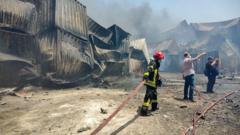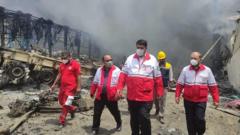The Israeli military has conducted an airstrike in Beirut, targeting the militant group Hezbollah, raising alarms about the potential for renewed conflict in the region.
Israeli Airstrike on Beirut Raises Concerns Over Increased Regional Tensions

Israeli Airstrike on Beirut Raises Concerns Over Increased Regional Tensions
Israel targets Hezbollah stronghold as fears grow for stability in Lebanon following recent hostilities.
The Israeli military has executed an aerial attack on a residential area in the southern suburbs of Beirut, targeting the Hezbollah militant group's stronghold. This incident has stoked fears that the fragile cease-fire established earlier between Israel and the Lebanese group could unravel.
In an official statement from Israeli leaders, Prime Minister Benjamin Netanyahu and Defense Minister Israel Katz highlighted that the strike focused on infrastructure within the Dahiya district, alleging that Hezbollah was storing precision missiles in the area. They emphasized that Israel would take all necessary measures to counteract Hezbollah's growing military capabilities and declared that the Dahiya area would not be permitted to function as a bastion for the organization.
While Hezbollah did not comment on the attack immediately, the President of Lebanon, Joseph Aoun, condemned the Israeli actions, stating they threaten national stability and escalated regional security risks. Aoun urged international oversight from France and the United States—parties involved in mediating the cease-fire agreement—to compel Israel to halt its military operations. He reiterated that Israel's ongoing violations of Lebanon's sovereignty and integrity are intolerable under any circumstances.
In an official statement from Israeli leaders, Prime Minister Benjamin Netanyahu and Defense Minister Israel Katz highlighted that the strike focused on infrastructure within the Dahiya district, alleging that Hezbollah was storing precision missiles in the area. They emphasized that Israel would take all necessary measures to counteract Hezbollah's growing military capabilities and declared that the Dahiya area would not be permitted to function as a bastion for the organization.
While Hezbollah did not comment on the attack immediately, the President of Lebanon, Joseph Aoun, condemned the Israeli actions, stating they threaten national stability and escalated regional security risks. Aoun urged international oversight from France and the United States—parties involved in mediating the cease-fire agreement—to compel Israel to halt its military operations. He reiterated that Israel's ongoing violations of Lebanon's sovereignty and integrity are intolerable under any circumstances.


















